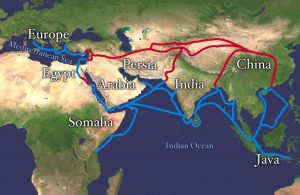By Sarah-Claire Jordan
 You may have heard the term “lingua franca” before, possibly in one of the other articles posted on this blog. The quick and dirty definition of a lingua franca is a language used as a form of communication between two groups who do not speak the same native language. Lingua francas have been pivotal throughout history for commerce and the general exchange of information from one culture to another, and continue to have this role to this day.
You may have heard the term “lingua franca” before, possibly in one of the other articles posted on this blog. The quick and dirty definition of a lingua franca is a language used as a form of communication between two groups who do not speak the same native language. Lingua francas have been pivotal throughout history for commerce and the general exchange of information from one culture to another, and continue to have this role to this day.
Why are they called “lingua francas”?
The term “lingua franca” comes from the name of a language used in the Mediterranean Sea from the late Medieval era up to the 18th century. The language was called Mediterranean Lingua Franca or Sabir. Sabir was a pidgin language, but not all lingua francas are pidgins. “Lingua franca” literally translates to “language of the Franks”, where “Franks” refers to any Western Europeans during the time of the Byzantine Empire.
What do all lingua francas have in common?
Though there are a great number of them, all lingua francas share some of the same characteristics. Despite some lingua francas being pidgins or creoles, this is not a requisite, as many languages such as Arabic, Spanish, and, increasingly, English, are used in many areas of the world as a means to form a linguistic bridge between two cultures that otherwise could not be formed. Lingua francas do not stay within the boundaries of the communities which speak it as a native language, and thus cannot be grouped in with languages that function that way.
What are some of the most common lingua francas?
English is by far one of the most common lingua francas in the world today, particularly in the areas of business, technology, science, and more. Other lingua francas are common as well, but sometimes tend to be used only in certain regions of the world. These include Chinese, Arabic, French, Spanish, and Russian. Beyond English, the most common lingua franca of a region depends heavily on which region you are talking about.
Can lingua francas be created?
In a sense, yes, lingua francas can be created, but they won’t be categorized as lingua francas. They will be called “constructed international auxiliary languages” and they generally do not become very popular and fall out of use quickly. The 19th century saw a huge interest in the creation of languages that would serve as trade languages, such as Volapük and Esperanto. Esperanto is probably the most popular of these constructed languages, with the number of speakers continuing to increase. However, most governments have no interest in funding or even legalizing Esperanto, so its use has many limitations.



